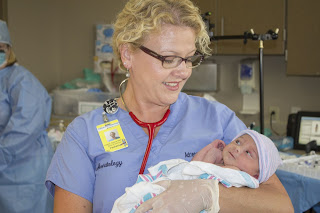It's a Good Time for Registered Nurses
 |
| Registered Nurses Careers |
The healthcare industry is experiencing phenomenal growth,
and there is at present a nationwide shortage of nurses. With the increasing
population, this deficit is predicted to get worse in the coming decade - which
makes the field of nursing a very rewarding career proposition.
Unfortunately, not only is there a shortage of nurses, there
is also a shortage of nursing educators. So those looking to get into a good
nursing program have to face a lot of competition. Nursing students are finding
it difficult to find programs of their choice, and when they do, they are often
wait listed. However, this wait is worth it. As qualified nurses are very much
in demand - and will continue to be, their wages too, are expected to keep
rising. This sector constitutes one of the largest healthcare occupations, with
2.3 million jobs available for qualified Registered Nurses. This number is also
on the increase with new career openings for registered nurses being created every day.
Registered nurses, or RN's work to support the health and well being of the community, prevent disease, and care for patients who are dealing with illness. Being the advocates and health educators for the community, their patients and families, they have to deal with direct patient care. Part of their duty is to observe patients, record their symptoms and track the patient progress. They also assist doctors during surgery, treatment, and examinations, administer medications, and assist during convalescence and therapy. Registered nurses work in various healthcare settings, with a majority of them working in hospital settings. They provide bedside nursing care for patients, and carry out medical regimens according to the patient care plan. They also supervise licensed practical nurses, enrolled nurses and nursing aides. Hospital nurses are typically assigned to one department, such as ear-nose-throat(ENT), surgery, orthopedics, maternity, pediatrics, emergency, intensive care, or the treatment of cancer patients.
Registered nurses, or RN's work to support the health and well being of the community, prevent disease, and care for patients who are dealing with illness. Being the advocates and health educators for the community, their patients and families, they have to deal with direct patient care. Part of their duty is to observe patients, record their symptoms and track the patient progress. They also assist doctors during surgery, treatment, and examinations, administer medications, and assist during convalescence and therapy. Registered nurses work in various healthcare settings, with a majority of them working in hospital settings. They provide bedside nursing care for patients, and carry out medical regimens according to the patient care plan. They also supervise licensed practical nurses, enrolled nurses and nursing aides. Hospital nurses are typically assigned to one department, such as ear-nose-throat(ENT), surgery, orthopedics, maternity, pediatrics, emergency, intensive care, or the treatment of cancer patients.
 |
| Paediatric Nursing |
If you wish to become an RN, there are three streams you
could choose. You may graduate from a 4-year Bachelor of Sciences in Nursing,
an Associates of Nursing, or a Nursing Diploma program offered by hospitals. You
will also need to pass a national licensing examination. Once you have a registered
nursing degree, there is a national licensing section that makes it easier to
get licensed in multiple states. If you wish to work in another state this is
helpful. Statistics given out by the Department of Labor Statistics indicate
that registered nurses will be in great demand for the foreseeable future. There
will be more new nursing jobs open than jobs in any other field. At present,
there is a huge shortage of qualified nurses to even come close to filling the
projected demand. This is a lucrative profession too- with the average salary
for a nurse being approximately $48,000, while the higher 10% make upwards of
$69,000 annually.











0 comments:
Post a Comment